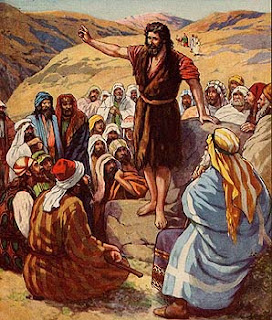Have you ever wondered why Jesus seldom answers a question directly? People will come to him, ask him something relatively straight-forward like “Should we pay taxes?” (Mt. 22.17), but never get a simple answer (“Render unto Caesar the things which are Caesar’s, and unto God the things that are God’s” Mt. 22.21). In today’s Matthew lection, we get another example of a somewhat simple question: “Are you the one who was to come, or should we expect someone else” (Mt. 11.3)?
Jesus answers: “Go back and report to John what you hear and see: The blind receive sight, the lame walk, those who have leprosy are cured, the deaf hear, the dead are raised and the good news is preached to the poor” (Mt. 11.4-5). Instead of saying, “Yes I am,” which – to me – is the implied answer, Jesus compares his works to works found in various places in Isaiah (26.19;29.18; 42.7, 18; 61.1), including today’s Isaiah lection (32.5-6). Today’s Isaiah lection reads, “Then will the eyes of the blind be opened and the ears of the deaf unstopped. Then will the lame leap like a deer, and the mute tongue shout for joy.”
Why does he do this? I think it is because he wants to teach people about the scriptures and let them make the connections for themselves. Jesus did not come to dictate faith to people – he was a teacher. Jesus spoke in parables, not only so it would be easy to retell and pass on the stories, but so each person can find meaning in the narrative. Jesus was here for more than just answers – he had a message that was more profound than do and don’t; yes and no.
My roommate in undergrad used to ask me a lot of questions about philosophy, religion and politics (I was a philosophy major and opinion columnist for the university paper, and we were both people concerned with spiritual questions). Often, he would tease me about frequently answering questions, “yes and no…” and then immediately proceed into an explanation. Even though he joked about it, he also appreciated it. My answers revealed not only the answer, but how I arrived there. It also sparked a discussion. After all, he didn’t walk into my room and ask “Do you believe you can petition the Lord with prayer?” for a simple yes or no. He had his own ideas, and he wanted to know mine.
Jesus is so inspiring because, when people ask Jesus questions, he sees what is behind the question, what is on their minds. John’s disciples wanted to know if Jesus was the one John preached would come, if Jesus fulfilled Scripture. But they didn’t come just to see if Jesus was legit, but also if their teacher was correct in his prophecies. It is not a coincidence that Jesus assures the crowd that John is “the one about who is written: I will send my messenger ahead of you, who will prepare your way before you” (Mt. 11.10) as John’s disciples are leaving. In just a few verses after the lection ends, Jesus claims John is Elijah: “and if you are willing to accept it, he is Elijah who is to come. Let anyone with ears listen” (Mt. 11.14)! Without directly answering John’s disciples, he gives them what they long to hear, and they learn for themselves.
I am thankful that Jesus not only had answers, but was willing to teach them.
 This picture reminds me of Sunday School. John the Baptist -- the Voice in the Desert.
This picture reminds me of Sunday School. John the Baptist -- the Voice in the Desert.
No comments:
Post a Comment